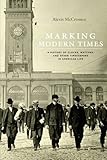Marking modern times : a history of clocks, watches, and other timekeepers in American life / Alexis McCrossen.
Material type: TextPublisher: Chicago : The University of Chicago Press, 2013Description: xvi, 255 pages : illustrations ; 24 cmContent type: text Media type: unmediated Carrier type: volumeISBN: 9780226014869; 022601486XSubject(s): Clocks and watches -- United States -- History -- 19th century | Clocks and watches -- United States -- History -- 20th century | Clocks and watches | United States | 1800-1999Genre/Form: History.DDC classification: 681.1/1 LOC classification: TS543.U6 | M396 2013
TextPublisher: Chicago : The University of Chicago Press, 2013Description: xvi, 255 pages : illustrations ; 24 cmContent type: text Media type: unmediated Carrier type: volumeISBN: 9780226014869; 022601486XSubject(s): Clocks and watches -- United States -- History -- 19th century | Clocks and watches -- United States -- History -- 20th century | Clocks and watches | United States | 1800-1999Genre/Form: History.DDC classification: 681.1/1 LOC classification: TS543.U6 | M396 2013| Item type | Current library | Call number | Copy number | Status | Notes | Date due | Barcode |
|---|---|---|---|---|---|---|---|
 Books
Books
|
Female Library | TS543.U6 .M396 2013 (Browse shelf (Opens below)) | 1 | Available | STACKS | 51952000199403 | |
 Books
Books
|
Main Library | TS543.U6 .M396 2013 (Browse shelf (Opens below)) | 1 | Available | STACKS | 51952000199410 |
Browsing Female Library shelves Close shelf browser

|

|

|

|

|

|

|
||
| TS195.4 .H45 2017 Managing packaging design for sustainable development : a compass for strategic directions / | TS195.4 .H45 2017 Managing packaging design for sustainable development : a compass for strategic directions / | TS533.4.I74 .E43 1995 Firearms of the Islamic world in the Tareq Rajab Museum, Kuwait / | TS543.U6 .M396 2013 Marking modern times : a history of clocks, watches, and other timekeepers in American life / | TT15 .A33 2013 The invention of craft / | TT157 .Y67 2015 Wall art : 35 fresh and striking projects to decorate your walls / | TT196 .N35 2009 Furniture design and construction for the interior designer / |
Includes bibliographical references (pages 185-246) and index.
Unveiling the jewelers' clock -- Time's tongue and hands: the first public clocks in the United States -- Clockwatching: the uneasy authority of clocks and watches in antebellum America -- Republican heirlooms, instruments of modern time discipline: pocket watches during and after the Civil War -- Noon, November 18, 1883: the abolition of local time, the debut of a national standard -- American synchronicity: turn-of-the-century tower clocks, street clocks, and time balls -- Monuments and monstrosities: the apex of the public clock era -- Content to look at my watch: the end of the public clock era.
In Marking Modern Times, Alexis McCrossen relates how the American preoccupation with time led people from across social classes to acquire watches and clocks, and expands our understanding of the ways we have standardized time and have made timekeepers serve as political, social, and cultural tools in a society that not merely values time, but regards access to it as a natural-born right.
1 2

There are no comments on this title.